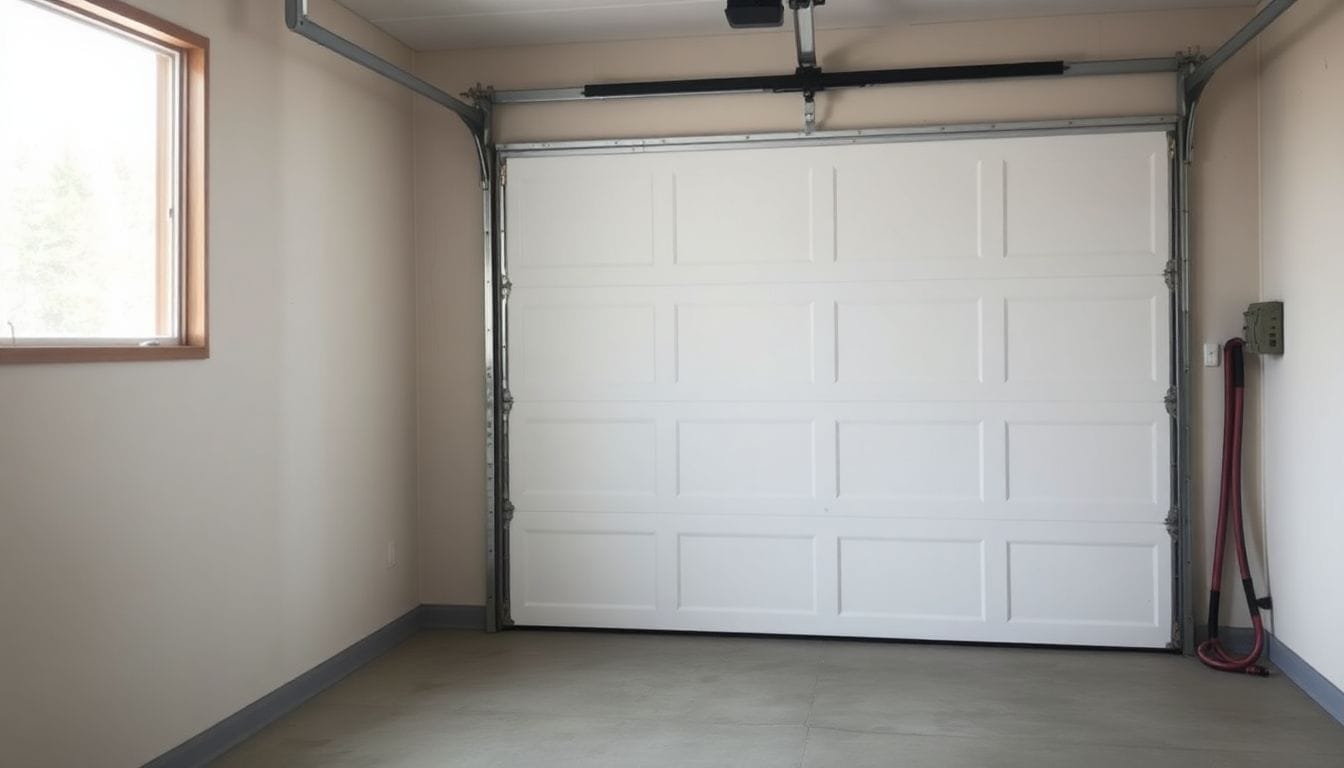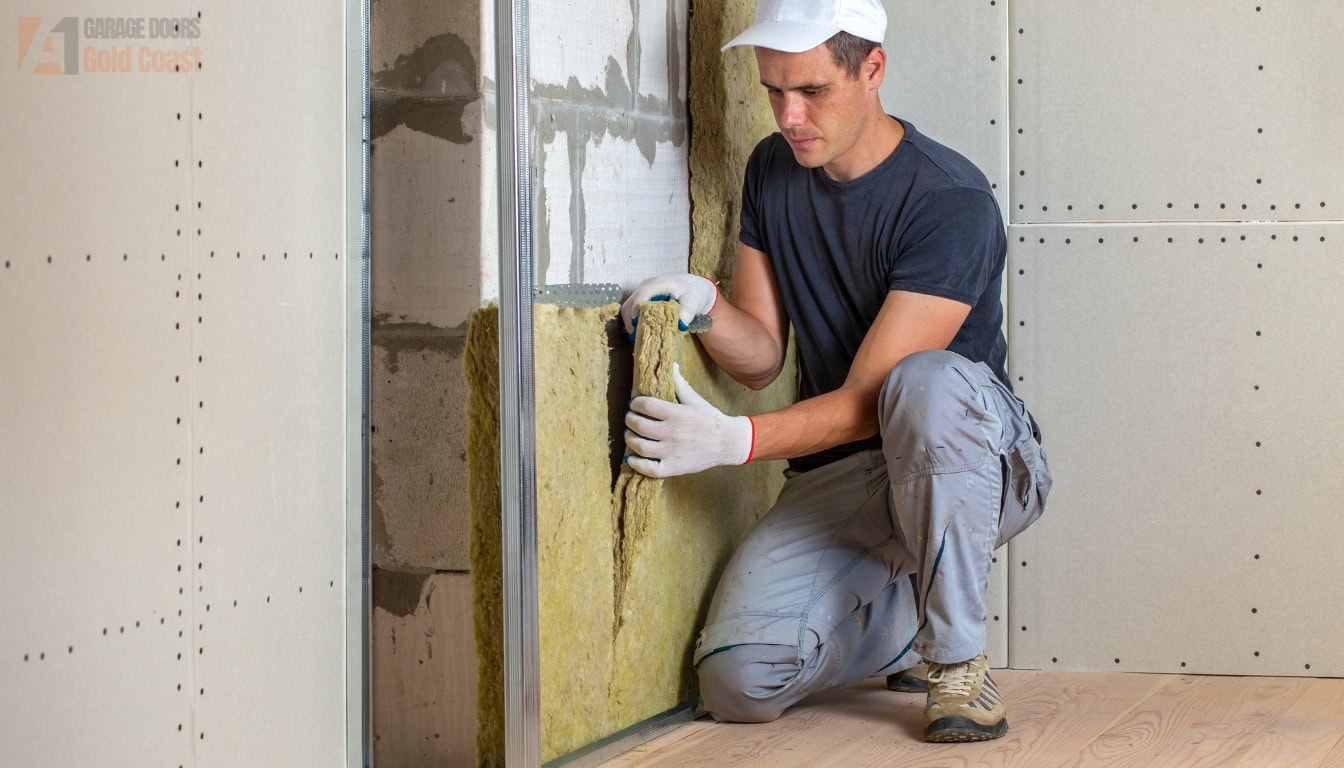Maximizing Energy Efficiency: Garage Door Insulation R-Value Explained
Are your energy bills higher than you’d like because your garage door isn’t keeping the temperature steady? The garage door insulation r-value measures how well your garage door resists heat flow.
This article will help you choose the right r-value for your garage door insulation and improve your home’s energy efficiency. Find out how better insulation can make a big difference.
Key Takeaways
- Higher R-Value Improves Efficiency: A higher R-value garage door insulation better resists heat flow, keeping garages warmer in winter and cooler in summer, which lowers energy bills.
- Australian R-Values Differ: Australian R-values are about 5.7 times lower than in the USA, with a typical value of 0.4 per 25 mm thickness, affecting insulation choices.
- Variety of Insulation Types: Options include fibreglass batt, cellulose fibre, rigid foam, polystyrene, and polyurethane, each offering different R-values and benefits for energy efficiency.
- Cost Factors: Insulation costs depend on material (e.g., PIR £12–£18/sqm, EPS £7–£12/sqm), R-value, garage size, and whether upgrading or installing new doors, with total costs ranging from £300 to £2,500.
- Additional Benefits: Insulated garage doors save energy and extend door lifespan, reduce noise by up to 18 dB, and increase home value.
Understanding R-Value
 R-value measures how well insulation resists heat flow. A higher R-value means better insulation performance. For example, an R-16 insulation stops more heat compared to R-12. In Australia, R-values are about 5.7 times lower than in the USA.
R-value measures how well insulation resists heat flow. A higher R-value means better insulation performance. For example, an R-16 insulation stops more heat compared to R-12. In Australia, R-values are about 5.7 times lower than in the USA.
A typical Australian R-value is 0.4 per 25 mm thickness. This difference affects how you insulate your garage door.
Choosing the right garage door R-value helps keep your insulated garage comfortable. Materials like polyurethane and polystyrene offer high R-values. Insulated garage doors reduce heat transfer, making your garage more energy efficient.
Homeowners benefit from lower energy bills and a stable temperature inside the garage.
A higher R-value garage door can significantly improve your home’s energy efficiency and comfort.
Importance of R-Value in Garage Door Insulation
Higher R-values enhance the thermal insulation of garage doors, keeping garages warmer in winter and cooler in summer. This efficient thermal resistance reduces the need for heating and cooling, lowering electricity bills.
Insulated garage doors with elevated garage door r-values also extend the door’s lifespan by minimising material wear from temperature fluctuations. For spaces like workshops or gyms, an R-16 insulation value ensures optimal comfort and energy efficiency.
Selecting the appropriate insulation value is crucial for maintaining a comfortable and energy-efficient garage.
Airtight garage doors maximise the effectiveness of insulation, preventing heat loss and cold drafts. Using a garage door insulation kit simplifies the installation process, allowing homeowners to choose from various insulation materials such as foam or polyisocyanurate.
Different types of garage door insulation, including batt insulation and foam panels, offer superior thermal resistance and noise reduction. Manufacturers like Clopay provide insulated doors with high r-values, promoting energy conservation and sustainable living.
Proper insulation enhances thermal efficiency and contributes to a longer-lasting garage door.
Types of Garage Door Insulation
Garage door insulation comes in several types, each with unique benefits. Choosing the right material can enhance your garage’s energy efficiency.
- Fibreglass Batt Insulation
- Easy to install and widely available.
- Fits well into most garage door sections.
- Provides good thermal resistance.
- Cellulose Fibre Insulation
- Made from recycled paper products.
- Fire retardant, offering added safety.
- Eco-friendly option for sustainable homes.
- Rigid Foam Insulation
- Simple to cut and shape for door panels.
- Highly thermally efficient, reducing heat loss.
- Durable and long-lasting performance.
- Polystyrene Insulation
- Commonly used in everyday items like coffee cups.
- Less effective than polyurethane for garage doors.
- Lightweight and easy to handle during installation.
- Polyurethane Insulation
- Expands to fill gaps, ensuring no air leaks.
- Excellent for entry doors and garage sections.
- Provides superior thermal resistance compared to other materials.
Selecting the appropriate insulation type sets the foundation for maximising your garage door’s R-value.
Choosing the Right R-Value for Your Garage
Selecting the appropriate R-value for your garage door enhances energy efficiency and comfort. For attached garages, a high R-value door is essential to keep your home warm and reduce energy costs.
If your garage is detached and unheated, lighter insulation or even no insulation might be sufficient. Workshops or gyms within your garage should use insulation with at least R-16 to maintain a stable environment.
Insulated garage doors improve energy use and increase your home’s value, offering a good return on investment when you decide to sell. Choosing the right R-value ensures your garage meets your specific needs and supports efficient energy use.
Benefits of Higher R-Value Garage Doors
Choosing the right R-value sets the stage for maximising your garage door’s efficiency. Higher R-value garage doors offer numerous benefits. They reduce electricity bills by minimising energy loss, making your garage more energy-efficient. Homeowners looking to explore garage conversion ideas often find that understanding insulation and R-values is a key first step in creating a comfortable, energy-efficient space.
Insulated doors maintain a comfortable temperature, especially important for attached garages. Furthermore, a higher R-value extends the door’s lifespan by decreasing wear and tear.
These doors also enhance strength and lower noise levels by up to 18dB, creating a quieter garage space.
A higher R-value garage door makes a noticeable difference in both energy savings and comfort.
Factors Influencing Garage Door Insulation Costs
Building on the advantages of higher R-value garage doors, various factors determine the insulation costs.
| Factor | Description | Cost Impact |
|---|---|---|
| Insulation Material | Different materials offer varying R-values and costs. | Polyisocyanurate (PIR) costs $12-$18 per sqm; Expanded Polystyrene (EPS) costs $7-$12 per sqm. |
| R-Value Rating | Higher R-values provide better insulation. | Higher R-values generally increase the cost due to better materials. |
| Surface Area | Larger garage doors require more insulation material. | Total insulation costs range from $300 to $900 based on area. |
| Thickness of Insulation | Thicker insulation enhances energy efficiency. | Increased thickness can raise material costs. |
| Delivery Charges | Transporting materials to your location adds to costs. | Delivery fees vary depending on distance and supplier. |
| Upgrade vs. New Purchase | Upgrading existing doors is often cheaper than buying new ones. | Upgrading costs between $1,200 and $2,500, while new doors are more expensive. |
Supplementary insights on Garage Door Insulation
Adding insulation to your garage door can enhance energy efficiency and lower your heating bills, whether you install it yourself or hire a professional. Understanding the differences between U-Factor and R-Value is essential for selecting the most effective insulation for your garage.
Can I install garage door insulation myself?
Installing garage door insulation yourself is a practical way to reduce costs and enhance your garage’s energy efficiency. Choose materials like rigid foam or fibreglass blankets for effective insulation.
These options provide a high R-value, which improves thermal resistance and keeps your garage comfortable year-round. DIY insulation kits are available from suppliers such as KoolDoor, which you can order by calling 1300 37 38 39.
The process is straightforward for those with basic handyman skills. Measure your garage door panels accurately and cut the insulation material to fit. Secure the insulation using adhesive or fasteners as recommended.
Proper installation ensures that your garage remains insulated, reducing energy consumption and maintaining a stable temperature. By taking on this project yourself, you can enjoy the benefits of a well-insulated garage without the expense of professional installation.
What are U-Factor and R-Value differences?
Choosing the right garage door insulation involves understanding U-factor and R-value differences. R-value measures a material’s ability to resist heat flow, indicating its insulation effectiveness.
For instance, B&D insulation has an R-value of 1.4 W/m²K, providing strong thermal resistance. Conversely, the U-factor measures how quickly heat transfers through a material. A lower U-factor signifies better insulation performance.
Both R-value and U-factor are essential for assessing the energy efficiency of your garage door with insulation.
Is an insulated garage door worth the investment?
Investing in an insulated garage door can greatly reduce your heating and cooling bills, sometimes cutting them by half. A higher R-value door enhances your garage insulation, keeping temperatures stable and improving energy efficiency.
Brands like B&D provide various designs and long warranties, ensuring your door remains durable and stylish. Furthermore, an insulated garage door increases your home’s value, offering a strong return on investment when you sell.
These advantages make an insulated garage door a smart choice for many homeowners.
Related Aspects of Insulation: Acoustic Considerations in Garages
Insulating your garage door boosts energy efficiency while cutting noise levels by up to 18dB. An insulated door helps muffle sounds from tools, vehicles, and external traffic, creating a quieter space.
Installing a quality bottom weather seal enhances soundproofing by blocking gaps where noise can enter. Furthermore, keeping perimeter weather stripping flexible during cold weather maintains better noise control.
These acoustic improvements make an insulated garage door a valuable addition for both comfort and functionality.
How to Improve Existing Garage Door Insulation
Enhancing your existing garage door insulation can significantly improve energy efficiency and comfort. Implementing the right strategies ensures your garage remains warm in winter and cool in summer.
- Upgrade Weather Stripping
Replace old weather stripping with high-quality materials. This prevents draughts and reduces thermal conductance around the door edges. - Install a Thermal Break
Add a thermal break between the door panels. This minimises heat transfer and avoids thermal bridges at section ends, enhancing insulation effectiveness. - Apply a Quality Bottom Seal
Fit a durable bottom weather seal to block cold air from entering. A quality seal also keeps out pests and moisture, protecting your garage. - Add Insulation Panels
Install insulation panels made from polyurethane or other effective materials. Higher R-value panels provide superior thermal resistance, improving overall insulation. - Seal Gaps and Cracks
Use caulk or expanding foam to seal any gaps or cracks around the garage door. This step reduces air leaks and enhances the door’s thermal performance. - Consider Insulated Garage Doors
If your budget allows, invest in a new insulated garage door. Manufacturers like Clopay offer options with higher R-values for increased energy efficiency. - Enhance Wall Insulation
Improve the insulation of garage walls to complement your door insulation. Proper wall insulation works together with the door to maintain a stable temperature. - Upgrade to a Sectional Garage Door
Switch to a sectional garage door system. These doors provide better insulation and smoother operation, contributing to energy savings. - Install B&D’s BAL-Maze Doors for Bushfire Areas
For properties in bushfire-prone areas, consider B&D’s BAL-Maze doors. They offer additional insulation and protection against extreme conditions. - Regular Maintenance
Perform regular maintenance on your garage door system. Ensuring all components function correctly helps maintain optimal insulation and energy efficiency.
Conclusion
Choosing the right R-value for your garage door insulation can greatly enhance energy efficiency. Higher R-values offer better thermal resistance, keeping your garage warm in winter and cool in summer.
Selecting quality materials like polystyrene or polyurethane ensures long-lasting insulation. Proper installation also helps reduce energy bills and extends your door’s lifespan.
Invest wisely to enjoy a more comfortable and efficient garage.
FAQs
1. What is R-value in garage door insulation?
R-value measures the insulation’s ability to resist heat flow. A higher R-value means better thermal resistance. Choosing the right R-value helps keep your garage attached to your home warm in winter and cool in summer.
2. What types of insulation are available for garage doors?
Common types of garage door insulation include polyurethane insulated panels and other building insulation materials. Metal garage doors can be fitted with insulation products to reduce thermal conductance and improve energy efficiency.
3. How does garage door insulation benefit my home?
Insulating your garage helps maintain a stable temperature, reducing the load on heating, ventilation, and air conditioning systems. It also keeps your garage space comfortable and can lower energy bills by improving overall building insulation.
4. What R-values are recommended for garage doors?
Higher R-values provide superior insulation. For residential garages, an R-value between 6 and 8 is often recommended. This ensures efficient insulation, helping to keep your garage and attached home energy-efficient.
5. Can I install insulation in my existing garage door?
Yes, installing insulation in your garage door is possible. Choose the right insulation options based on your door type, such as polyurethane insulated panels. Proper installation makes all the difference in enhancing thermal resistance and energy efficiency.
6. How do I choose the best garage door insulation?
Consider the type of insulation, R-value, and price. Look for insulation products that offer high thermal resistance and suit your garage door type. Consulting with garage door manufacturers can provide guidance on the best insulation solutions for your needs.
Quality Garage Door Repairs at Your Service
Call Reece at (07) 5515 0277 for quality garage door repairs you can trust. Visit us today for expert assistance and friendly service!


